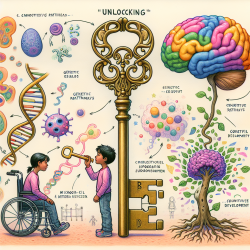Introduction
As a speech-language pathologist, you might wonder what insights a study on hepatitis C treatment adherence could offer to your practice. Surprisingly, the research titled "Experiences with interferon-free hepatitis C therapies: addressing barriers to adherence and optimizing treatment outcomes" provides valuable lessons on adherence and treatment optimization that can be applied to speech therapy. This blog explores how these insights can enhance your practice and improve outcomes for children.
Key Insights from the Research
The research conducted at three Veterans Affairs Medical Centers revealed several themes that contribute to successful treatment adherence. These include:
- Experience with Older Treatments: Patients who had prior experience with older treatments were more likely to adhere to new regimens.
- Hope for Improvement: Optimism about treatment outcomes motivated patients to complete their therapy.
- Symptom Relief: Perceived improvement in symptoms encouraged adherence.
- Positive Patient-Provider Relationship: Trust and empathy in the patient-provider relationship were crucial for adherence.
- Tailored Organized Routines: Consistent routines and social support facilitated treatment completion.
Applying These Insights to Speech Therapy
While the context of hepatitis C treatment is different from speech therapy, the underlying principles of adherence and motivation are universal. Here's how you can apply these insights to your practice:
- Leverage Experience: Just as patients with prior treatment experience adhered better, children who have had positive experiences with speech therapy are more likely to engage. Use past successes to motivate and set expectations for new sessions.
- Foster Hope and Optimism: Cultivate a positive outlook by setting achievable goals and celebrating small victories. This can boost a child's motivation and commitment to therapy.
- Symptom Relief as Motivation: Highlight the improvements and progress made in speech therapy to encourage continued participation. Children and parents need to see tangible benefits to stay engaged.
- Build Strong Relationships: Develop trust and rapport with both the child and their family. A supportive relationship can significantly enhance adherence to therapy recommendations.
- Establish Routines: Encourage families to integrate speech therapy activities into daily routines. Consistency and structure can help reinforce learning and adherence.
Encouraging Further Research
While the research provides valuable insights, it's essential to continue exploring how these principles can be tailored to speech therapy. Consider conducting your own studies or collaborating with researchers to further investigate adherence strategies in your field.
Conclusion
By applying the lessons from hepatitis C treatment research, speech-language pathologists can enhance their practice and create better outcomes for children. Understanding and addressing barriers to adherence, fostering hope, and building strong relationships are key strategies that can be adapted to any therapeutic context.
To read the original research paper, please follow this link: Experiences with interferon-free hepatitis C therapies: addressing barriers to adherence and optimizing treatment outcomes.










